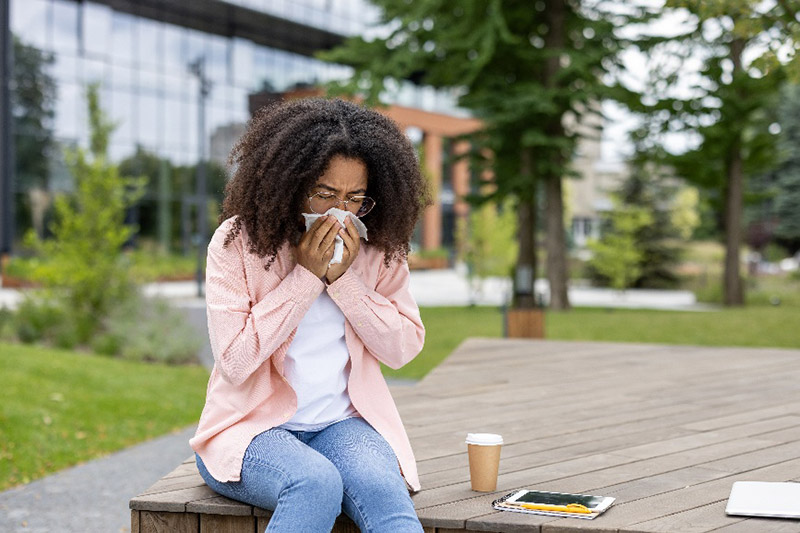
Your Guide to Surviving Allergy Season: Tips from Dr. David Jakubowicz
Spring is a beautiful season, but for many, it comes with a price—sneezing, itchy eyes, congestion, and fatigue. If you suffer from seasonal allergies, you’re not alone. Pollen levels peak in the spring, triggering allergic reactions for millions of people.
Dr. David Jakubowicz, MD, FACS, Medical Director of Otolaryngology and Allergy at Essen Health Care, is also a Fellow of the American Academy of Otolaryngic Allergy. This distinction recognizes his advanced expertise and commitment to the field of allergy treatment. He has helped numerous patients effectively manage their allergies. With years of experience in ear, nose, and throat care, he understands the unique challenges allergy sufferers face. In this article, Dr. Jakubowicz, MD, FACS, shares his top tips to help you navigate allergy season, along with the impact that allergies can have on your health if left untreated.
What Causes Spring Allergies?
Spring allergies occur when your immune system mistakenly identifies harmless airborne substances—like pollen, dust, or mold—as threats, triggering an inflammatory response. This overreaction releases chemicals like histamine, leading to classic allergy symptoms, including sneezing, congestion, itchy eyes, and sinus pressure.
During the spring season, allergy symptoms often worsen due to increased levels of airborne pollen and mold spores. The most common seasonal triggers include:
As trees begin to bloom, they release millions of tiny pollen grains into the air. Pollen counts tend to be highest in the early morning and on dry, windy days.
As the season progresses, grasses such as Kentucky bluegrass, ryegrass, and Bermuda grass begin to pollinate, triggering an increase in allergy symptoms.
Rising temperatures and spring showers create the perfect environment for mold to thrive, particularly in damp areas like basements, soil, and piles of wet leaves. Mold spores become airborne and can easily trigger allergy symptoms.

Why Allergy Symptoms Can Feel Worse in Cities
If you live in an urban area, such as the Bronx, you may notice that your allergies feel more intense. That’s because air pollution, longer pollen seasons, and limited green space make city environments harsher for allergy sufferers.
Air Pollution and Stronger AllergensCity air contains vehicle exhaust, industrial emissions, and fine particles that can irritate the respiratory system. Often, pollution can modify pollen proteins, making them more potent triggers for allergic reactions. Pollutants also weaken the respiratory system’s defenses, leading to worsening congestion, inflammation, and an increased risk of asthma.
Longer Allergy Seasons in CitiesUrban areas retain heat more than rural areas, leading to an “urban heat island” effect that causes:
- Earlier and longer pollen seasons – Trees release pollen earlier and continue for longer.
- Higher pollen concentrations – Warm air and stagnant conditions trap pollen in the air.
- Increased mold growth – Humidity and heat create ideal conditions for mold spores.
Unlike rural areas, where pollen disperses naturally, in cities, it tends to linger between buildings, resulting in prolonged exposure. Common street trees, such as oak, maple, and sycamore, produce high amounts of pollen in residential areas. Indoor allergens, such as dust mites, pet dander, and mold, can also exacerbate symptoms.
How to Manage Allergies in the City
While city living presents extra challenges for allergy sufferers, there are effective ways to reduce exposure and relieve symptoms. Dr. David Jakubowicz, MD, FACS, shares advice on managing seasonal allergies—helping you breathe easier this spring.
The primary allergy treatment approach is avoiding allergens whenever possible.
Regular use of antihistamines, such as fexofenadine, and topical treatments, including nasal sprays with steroids and/or antihistamines and antihistamine eye drops, can significantly help manage symptoms. Most of these medications are available over the counter.
Avoid spending long periods outdoors on sunny, warm days when pollen levels are highest. If you can’t avoid being outside, consider spending shorter periods outdoors and using an N95 mask for additional protection.
When indoors, change your clothes and close your windows to prevent pollen from entering.
Use weather forecasts to track pollen levels, and learn your personal triggers through allergy testing with Essen’s ENT and Allergy team.
By following these tips, you can minimize your exposure to allergens and more effectively manage your symptoms during allergy season.

The Impact of Unmanaged Allergies
Allergies are more than just a seasonal annoyance—they can have a significant impact on your health and overall quality of life. Dr. David Jakubowicz, MD, FACS, explains how untreated allergies can lead to a variety of complications:
Untreated allergies can trigger asthma, causing breathing difficulties, and eczema, which leads to unsightly rashes.
Constant nose blowing can result in nosebleeds and skin irritation around the nose.
Allergies can cause swelling of the vocal cords, leading to hoarseness or changes in your voice. Poorer lung function due to untreated allergies can also contribute to these symptoms.
Although rare with respiratory allergies such as those caused by trees, grasses, and molds, severe reactions can occur, leading to breathing difficulties and a closed throat, which can be life-threatening.
If left untreated, allergies can worsen and impact your daily life in ways you might not expect. Taking proactive steps to manage your symptoms can help prevent these complications and ensure better overall health.
Spring may bring warmer weather and blooming flowers, but it also brings the familiar challenges of allergy season. Seasonal allergies affect millions of people each year, whether it’s sneezing, itchy eyes, or congestion. Fortunately, with the right strategies and treatments, you don’t have to suffer through the season.
Identifying your allergy triggers, utilizing effective treatments, and implementing preventive measures to minimize exposure are essential. From avoiding allergens to using medications and monitoring pollen counts, these steps can help you breathe easier this spring. Unmanaged allergies can lead to more serious health issues, including asthma, eczema, and vocal changes, which is why it’s crucial to address symptoms early.
We strive to help you thrive despite your allergies. With Dr. Jakubowicz, MD, FACS, and the ENT team at Essen Health Care, you can find relief and enjoy all that the season has to offer.
Book your appointment today and start managing your allergies the right way!
About Dr. Jakubowicz

Dr. David Jakubowicz, MD, FACS, is the Director of Otolaryngology and Allergy at Essen Medical and a Clinical Assistant Professor at Albert Einstein College of Medicine. He holds a Bachelor of Science (BS) in Biology from Cornell University and a Doctor of Medicine (MD) from the New York University School of Medicine. Dr. Jakubowicz completed his internship in Surgery at Beth Israel Medical Center and his residency in Otolaryngology at Albert Einstein-affiliated hospitals.
A Fellow of the American Academy of Otolaryngologic Allergy, the American College of Surgeons, and the American Academy of Otolaryngology-Head and Neck Surgery, Dr. Jakubowicz was recently elected President of the Medical Society of the State of New York (MSSNY).